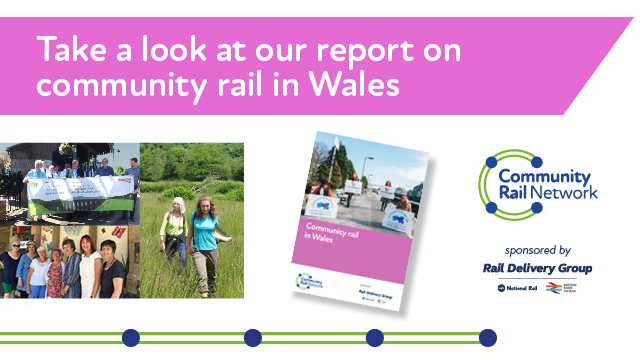Members of a growing grassroots rail movement have continued to strive for Welsh communities and work towards a greener transport future, despite the pandemic, and are looking forward to supporting local recovery.
Figures from Community Rail Network’s Community Rail in Wales report, sponsored by Rail Delivery Group and released today (31 March), highlight that more than 1,100 volunteers give 50,000 hours annually, valued at £4.3 million, to support social inclusion and wellbeing, sustainable and healthy travel, economic development, and tourism in their area.
Wales and Borders’ six community rail partnerships and 140 station friends groups engage local people with their railways and stations, working with train operators, local authorities and other partners. Their activities include: volunteering, community gardening, food growing and biodiversity projects at stations; community arts and heritage projects to help people learn about and take pride in their area; work with rail industry partners towards improvements and integration, such as shelters, signage or pedestrian and cyclist access; and events, workshops and activities to promote sustainable travel, bring people together, and celebrate local communities.
Community rail partnerships and groups have continued to grow in number and support communities and local resilience during the pandemic (see below). They are now looking forward to playing a key role in building back better and greener from Covid, helping our railways to be a vital component of a more sustainable and inclusive way forward, and supporting Wales’ new transport strategy Llwybr Newydd.
Community rail across Wales and Borders
The newly-formed South West Wales Connected community rail partnership recently held a series of online events, bringing together local groups to co-create shared visions and action plans for stations and their surroundings. These were hugely successful in generating ideas and priorities, to maximise the role the railway can play in fulfilling the aims of the Well-Being of Future Generations Act.
Last summer saw the Heart of Wales Line and South West Wales Connected offer small grants to help community groups continue through the pandemic or to drive positive change locally.
Station friends groups and social enterprises across Wales & the Borders- from Borth to Llandovery, Gobowen to Lamphey, Llanelli to Treherbert – are looking forward to resuming volunteering, community gardening, community cafes and various inclusion and environmental projects.
In a bid to boost sustainable travel by rail post-Covid, all Welsh community rail partnerships are working together to promote rail-based tourism throughout Wales, encouraging sustainable, scenic adventures through a new website that will offer information on where to find fantastic food, gorgeous gardens, heroic heritage, and obtainable outdoors.
Jools Townsend, chief executive of Community Rail Network, said: “Community rail works to make our railways community-minded and inclusive, and promotes sustainable travel by rail, bringing people together and bolstering local pride and wellbeing. In Wales, community rail partnerships and groups have adapted and responded, supporting communities through the pandemic, maintaining positivity, and advising rail partners on shifting local needs.
“As we start to rebuild from Covid, within the community rail movement, and across our railways, we will be redoubling efforts, to create confidence and togetherness, and help more people to get around by socially and environmentally responsible means. Community rail is all about communities and connectedness, and people working together locally to make things better for each other and our shared future – that couldn’t be more important right now.”
Robert Nisbet, director of nations and regions at the Rail Delivery Group, said: “The railway is at the heart of local communities and the fantastic initiatives by community rail volunteers in Wales play to its strengths, connecting people up and down the country. As we recover from the pandemic, getting more people back on trains will be vital to boost local economies and the environment, so the support of community rail will be more important than ever.”

